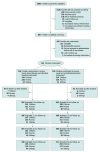Family-Based Behavioral Treatment for Childhood Obesity Implemented in Pediatric Primary Care: A Randomized Clinical Trial
- PMID: 37314275
- PMCID: PMC10265310
- DOI: 10.1001/jama.2023.8061
Family-Based Behavioral Treatment for Childhood Obesity Implemented in Pediatric Primary Care: A Randomized Clinical Trial
Erratum in
-
Error in Conflict of Interest Disclosures.JAMA. 2023 Aug 15;330(7):666. doi: 10.1001/jama.2023.14577. JAMA. 2023. PMID: 37477939 Free PMC article. No abstract available.
Abstract
Importance: Intensive behavioral interventions for childhood overweight and obesity are recommended by national guidelines, but are currently offered primarily in specialty clinics. Evidence is lacking on their effectiveness in pediatric primary care settings.
Objective: To evaluate the effects of family-based treatment for overweight or obesity implemented in pediatric primary care on children and their parents and siblings.
Design, setting, and participants: This randomized clinical trial in 4 US settings enrolled 452 children aged 6 to 12 years with overweight or obesity, their parents, and 106 siblings. Participants were assigned to undergo family-based treatment or usual care and were followed up for 24 months. The trial was conducted from November 2017 through August 2021.
Interventions: Family-based treatment used a variety of behavioral techniques to develop healthy eating, physical activity, and parenting behaviors within families. The treatment goal was 26 sessions over a 24-month period with a coach trained in behavior change methods; the number of sessions was individualized based on family progress.
Main outcomes and measures: The primary outcome was the child's change from baseline to 24 months in the percentage above the median body mass index (BMI) in the general US population normalized for age and sex. Secondary outcomes were the changes in this measure for siblings and in BMI for parents.
Results: Among 452 enrolled child-parent dyads, 226 were randomized to undergo family-based treatment and 226 to undergo usual care (child mean [SD] age, 9.8 [1.9] years; 53% female; mean percentage above median BMI, 59.4% [n = 27.0]; 153 [27.2%] were Black and 258 [57.1%] were White); 106 siblings were included. At 24 months, children receiving family-based treatment had better weight outcomes than those receiving usual care based on the difference in change in percentage above median BMI (-6.21% [95% CI, -10.14% to -2.29%]). Longitudinal growth models found that children, parents, and siblings undergoing family-based treatment all had outcomes superior to usual care that were evident at 6 months and maintained through 24 months (0- to 24-month changes in percentage above median BMI for family-based treatment and usual care were 0.00% [95% CI, -2.20% to 2.20%] vs 6.48% [95% CI, 4.35%-8.61%] for children; -1.05% [95% CI, -3.79% to 1.69%] vs 2.92% [95% CI, 0.58%-5.26%] for parents; and 0.03% [95% CI, -3.03% to 3.10%] vs 5.35% [95% CI, 2.70%-8.00%] for siblings).
Conclusions and relevance: Family-based treatment for childhood overweight and obesity was successfully implemented in pediatric primary care settings and led to improved weight outcomes over 24 months for children and parents. Siblings who were not directly treated also had improved weight outcomes, suggesting that this treatment may offer a novel approach for families with multiple children.
Trial registration: ClinicalTrials.gov Identifier: NCT02873715.
Conflict of interest statement
Figures



Comment in
-
Behavioral Interventions for Treating Childhood Obesity.JAMA. 2023 Jun 13;329(22):1920-1921. doi: 10.1001/jama.2023.1730. JAMA. 2023. PMID: 37314286 No abstract available.

